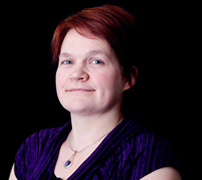 Our conversations on in silico methods in medicine are becoming more and more interesting. Christine Le Maitre, Professor of Cell Biology and Tissue Regeneration at Sheffield Hallam University, England, is the Head of the Tissue Engineering and Biomechanics Research Group at the Research Center. “My research for the past 20 years has been focused particularly on looking at what causes intervertebral disc degeneration. I have been looking at the cellular changes, which occur during this degeneration, and now I’m trying to use that knowledge to develop new strategies to treat disc degeneration, particularly looking at tissue engineering and stem cell therapies. There is no real good treatment for patients who suffer from disc degeneration. That is what really drives me: to try and develop new strategies to help these patients”.
Our conversations on in silico methods in medicine are becoming more and more interesting. Christine Le Maitre, Professor of Cell Biology and Tissue Regeneration at Sheffield Hallam University, England, is the Head of the Tissue Engineering and Biomechanics Research Group at the Research Center. “My research for the past 20 years has been focused particularly on looking at what causes intervertebral disc degeneration. I have been looking at the cellular changes, which occur during this degeneration, and now I’m trying to use that knowledge to develop new strategies to treat disc degeneration, particularly looking at tissue engineering and stem cell therapies. There is no real good treatment for patients who suffer from disc degeneration. That is what really drives me: to try and develop new strategies to help these patients”.
In silico medicine can really help here: “My principal area is working within wet labs, but if we can combine all the knowledge from the different disciplines and different areas that we can get, and use computer modeling to actually bring all of those complex ideas together, we can understand really complex biological processes and also predict potential therapies and how they may work in individual patients. That’s the real benefit of in silico medicine”.
Modeling and Simulation can definitely be a game changer for the healthcare industry: “I think modeling, understanding the disease processes, can tell us a lot more about potential targets so we can develop more clever strategies for targeting individual therapies to individual patients. But also, we can use those computer models and tailor them to patient phenotypes and different strategies. We can actually get personalized medicine developed, for example, particular criteria that apply to a particular patient, and then the model can tell you which of the therapies are predicted to be useful to them in the most successful manner”.
Today the life sciences industry is facing many challenges. “I think one of the key challenges in the industry in developing new therapies – particularly for the degeneration of musculoskeletal conditions – is that for the models they can utilize. For example, in intervertebral disc degeneration there are no very good animal models which can be utilized to test those therapies. So, we need better models to be able to help those industries to actually develop new therapies going forward. But also, it’s the cost of development so, when you actually have really clever ideas and you invent something new, the timeline to take that invention from the bench all the way to actually getting payback for the industries from the clinic is a very long period of time. So, in regenerative medicine, device development, and things like that, it can take 20 years from initial discovery to actually starting to get that monetary income back in, which obviously for the industry is a big problem. So, we need to speed up that developmental pipeline”. Modeling and simulation can be a very efficient answer.
See the full interview here:
